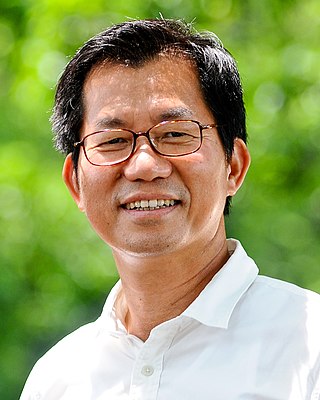Top Qs
Timeline
Chat
Perspective
Lee Ying-yuan
Taiwanese health economist and politician (1953–2021) From Wikipedia, the free encyclopedia
Remove ads
Lee Ying-yuan (Chinese: 李應元; pinyin: Lǐ Yìngyuán; Wade–Giles: Li3 Ying4-yüen2; Pe̍h-ōe-jī: Lí Èng-goân; 16 March 1953 – 11 November 2021) was a Taiwanese health economist and politician. He was elected to the Legislative Yuan in 1995 and stepped down in 2000. In 2005, Lee was appointed the Minister of Council of Labor Affairs, which he led until 2007. Lee has also served as Secretary-General of the Executive Yuan and the Democratic Progressive Party, and was reelected to the Legislative Yuan in 2012. He was appointed the Minister of Environmental Protection Administration (EPA) in 2016. He left the EPA in 2018, and subsequently served as Taiwan's representative to Thailand from 2020 to 2021.
Remove ads
Early life and education
Lee Ying-yuan was born into a Hakka family of farmers in Yunlin County in 1953. His ancestral home is in Zhao'an County, Fujian. After graduating from Taichung Municipal Taichung First Senior High School, he studied public health at National Taiwan University, where he graduated with a Bachelor of Science (B.S.) ranked second in his class and completed a Master of Science (M.S.) in public health in 1980 while working as a medical news reporter for the Taiwan Times. Yuan then pursued graduate studies in the United States at Harvard University and earned a Master of Public Health (M.P.H.) specializing in health policy and management from the Harvard T.H. Chan School of Public Health in 1981.[2]
In 1988, Lee earned his Ph.D. in health economics from the University of North Carolina at Chapel Hill.[3][4] His doctoral dissertation, completed under professor Deborah Freund, was titled, "The Supply of Physicians and their Incomes."[5]
Remove ads
Career
Upon Lee's graduation, he was slated to teach at NTU, but was placed on a blacklist and barred from returning to Taiwan by the Kuomintang-led government, stemming from his pro-democracy activities in the Formosa Incident during Taiwan's martial law period. During Lee's time as a student in the United States, he was also an active member of the World United Formosans for Independence, which attracted more of the KMT's attention.[6]
Return to Taiwan
After returning to Taiwan through illegal channels and avoiding intelligence agents for fourteen months, Lee was arrested in September 1991, and charged with violation of Article 100 of the Criminal Code. He was released in May 1992, after would-be colleagues at National Taiwan University intervened on his behalf. Revisions to Article 100 were also passed that month, and meant that evidence of possible threats had to be submitted to the Commission of Violence prior to indictment or arrest.[7][8]
Remove ads
Political career
Summarize
Perspective
Lee was elected to the Legislative Yuan in 1995.[9] He then became the youngest convener of the Democratic Progressive Party (DPP) caucus in the legislature. Following DPP’s successful presidential election in 2000, Lee was appointed by President Chen Shui-bian to be the Deputy Representative of the Taipei Economic and Cultural Representative Office (TECRO) in the U.S. and then Secretary-General of the Executive Yuan.[6] He was then named the DPP candidate for Taipei City's 2002 mayoral election, losing to incumbent mayor Ma Ying-jeou in a landslide.[10]
He was named the head of the Council of Labor Affairs in 2005, and stayed on in the Su Tseng-chang cabinet.[11] Under his leadership, the CLA sought to decrease the number of job-related deaths and injuries causing disabilities.[12][13] In 2008, Lee was named the Secretary-General of the Democratic Progressive Party and deputy Yunlin County magistrate under Su Chih-fen. He resigned the deputy magistracy to run in a legislative-by election caused by the annulment of Chang Sho-wen's election. However, Lee lost a primary to Liu Chien-kuo.[14] He was re-elected to the Legislative Yuan in 2012.[15]
During the summer of 2015, Lee accompanied DPP chairperson and presidential nominee Tsai Ing-wen on her visit to the United States, along with DPP General Secretary Joseph Wu.[16] Lee was named Tsai's Environmental Protection Administration minister after she won the 2016 election. He stated that his goal was to transform the EPA into a full-fledged ministry within 18 months of taking office.[17] On 1 December 2018, Lee stepped down from the EPA.[18]
In June 2020, Lee was appointed representative of Taiwan to Thailand, succeeding Tung Chen-yuan, and formally took office on 13 August 2020.[19][20] Lee's resignation from the position was approved on 4 August 2021, and took effect on 1 September 2021.[20]
Remove ads
Personal life
Lee was married to Laura Huang (黃月桂).[21]
Death
Lee died of pancreatic cancer on 11 November 2021, at the age of 68 in National Taiwan University Hospital.[22][23]
References
External links
Wikiwand - on
Seamless Wikipedia browsing. On steroids.
Remove ads



